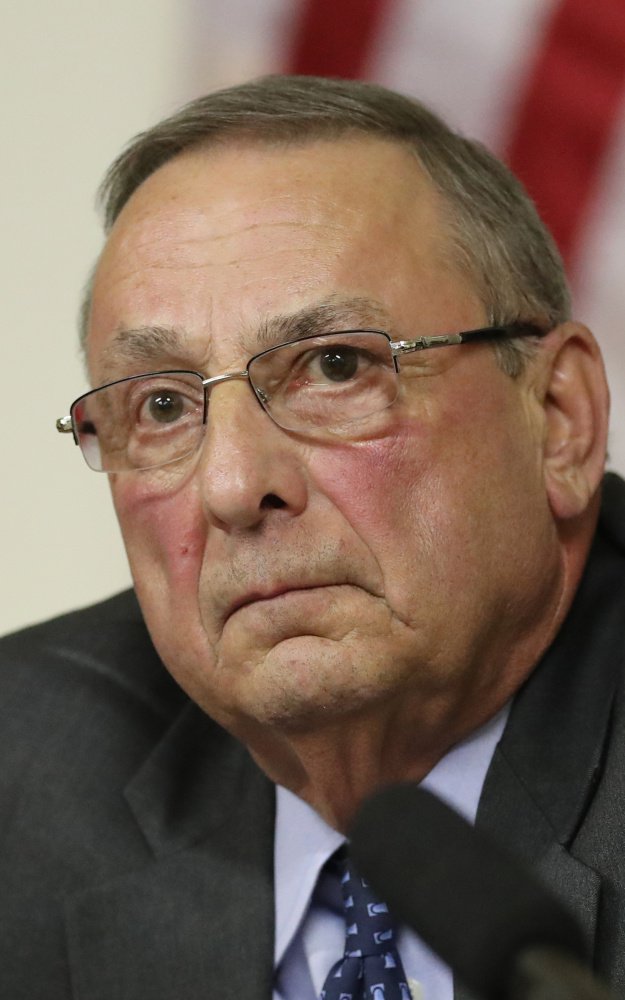Gov. Paul LePage said Tuesday that top Democrats at the State House should meet with him to negotiate the state’s next two-year budget.
The Republican governor’s $6.8 billion spending package is currently before the Legislature, but last week Democrats unveiled their own spending plan that totals about $7 billion.
LePage, talking with WVOM radio hosts Ric Tyler and George Hale, said the Democrats’ plan was more like a single page of talking points and not comparable to his more than 800-page budget proposal. He invited House Speaker Sara Gideon, D-Freeport, and Senate Minority Leader Troy Jackson, D-Allagash, to join him in negotiations.
“My suggestion would be this,” LePage said. “I would say to Speaker Gideon and Sen. Jackson, ‘Look, if you don’t like my budget, come on down and let’s talk about it, let’s see where we agree and where we don’t agree so instead of you building 800 pages maybe you only have to build two or three pages. Let’s sit down and talk about it.’ ”
LePage’s offer is a little softer than his previous stance on budget negotiations with the Legislature. The state spending plan is LePage’s last as he finishes the final two years of his second term in office.
LePage has seen only one of his budget proposals enacted since taking office in 2011 while the Legislature has passed two other two-year budgets and one supplemental budget into law over his vetoes.
Gov. LePage on WVOM Tuesday morning:
Lawmakers have less than two months to hammer out a compromise plan or risk a state government shutdown on July 1 if a new budget is not passed. Maine’s constitution requires the Legislature to pass a balanced budget every two years.
In his budget proposal unveiled in January, LePage wants to cut income and corporate taxes, reduce the state workforce by 500, further reduce welfare rolls and fundamentally change the state’s education funding formula. He also proposed nullifying a 3 percent surcharge on wealthy Mainers enacted by voters last November to provide public school funding. LePage’s plan would set the state’s top tax rate at 7.15 percent this year, down from the current 10.15 percent on earnings above $200,000. And by 2020, all taxpayers would be paying a flat tax of 5.75 percent under the governor’s budget proposal.
LePage also said Tuesday that he was confident the state could eliminate its income tax entirely if it were to increase the sales tax and expand it to more goods and services. LePage’s previous budget proposals also included provisions to expand and increase the sales tax.
But a citizens veto in June 2010 rejected a sales tax expansion after the Legislature, under Democratic Gov. John Baldacci, expanded it to cover a broader range of goods and services.
When asked what the current Democratic budget proposal was missing, LePage said, “Substance, it needs substance.”
“You know, where’s the beef, where’s the beef, boys?” LePage said. “All I see is one page of talking points, in my opinion, and I don’t mean to insult them because I really do want to sit down and work with them, but it was just grandstanding to the press because they have nothing.”
The Democratic proposal includes several new spending initiatives but also counts on new sales tax revenue from Amazon online sales and from sales of recreational marijuana, which Mainers voted to legalize in November. The Democrats’ plan calls for:
n Bringing the state’s share of public school funding to 55 percent by funneling an additional $370 million to education, thereby lowering the property tax burden on municipalities.
n Providing additional property tax relief by increasing revenue sharing for municipalities from the current 2 percent to 3 percent while increasing the homestead tax exemption from $20,000 to $30,000.
n Building or repairing roads, bridges and the broadband internet infrastructure through additional bond measures.
n Earmarking $55 million for “direct care worker reimbursement” to improve wages for those working in nursing homes, assisted living facilities or home care.
n Providing $5 million for as-yet-unspecified efforts to combat Maine’s worsening opioid addiction crisis.
To pay for the initiatives, Democrats are counting on an additional $181.5 million in tax revenues from Maine’s growing economy, $13.2 million from sales taxes on recreational marijuana products and $70 million in previously uncollected sales taxes from Amazon and other online purchases – figures Republicans said are inflated. The plan also hinges on the 3 percent tax surcharge remaining in place.
Scott Thistle can be contacted at:
sthistle@pressherald.com
Send questions/comments to the editors.




Success. Please wait for the page to reload. If the page does not reload within 5 seconds, please refresh the page.
Enter your email and password to access comments.
Hi, to comment on stories you must . This profile is in addition to your subscription and website login.
Already have a commenting profile? .
Invalid username/password.
Please check your email to confirm and complete your registration.
Only subscribers are eligible to post comments. Please subscribe or login first for digital access. Here’s why.
Use the form below to reset your password. When you've submitted your account email, we will send an email with a reset code.